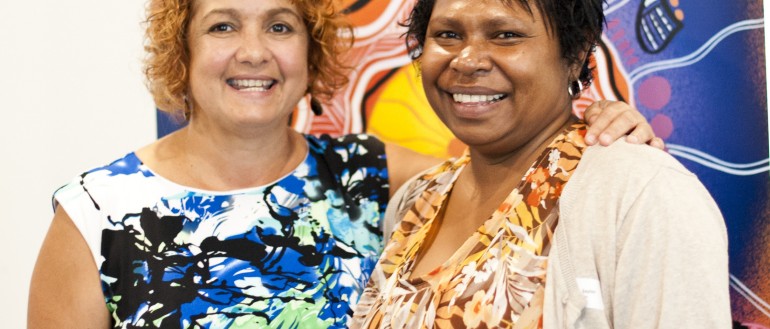Cancer care training tools win Harry Christian Giese - Research into Action Award
Harry Giese AM MBE (1913–2000) was a Territory community leader and administrator who played a key role in the establishment of the Menzies School of Health Research (Menzies) from the late 1970s to the 1990s.
In recognition of his outstanding contribution to the landscape of health and education in Northern Australia, the Giese family, with Menzies, have developed the Harry Christian Giese – Research into Action Award.
Division Leader of Epidemiology and Health Systems Associate Professor Gail Garvey has been named as the 2015 recipient of the Award to put her research in psycho-oncology, understanding and treating the social, psychological, emotional and spiritual aspects of cancer, from prevention to bereavement, into action.
A/Prof Garvey will work with health professionals and Indigenous participants to implement and improve existing needs assessment tools specifically designed for Indigenous Australians with cancer.
“Until recently cancer has been a low priority on the Indigenous health agenda, despite the disease being the second leading cause of death among Indigenous Australians and accounting for a greater number of deaths each year than diabetes and kidney disease.
“Late diagnosis, poor awareness and difficulties surrounding care all contribute to these higher mortality rates,” A/Prof Garvey said.
She will dedicate her award to encouraging the use of supportive cancer care needs assessment tools for Indigenous people, by developing a series of online training and instructional videos for health professionals. These will be made available online with an accompanying downloadable training manual and needs assessment tool.
“Navigating your way through the health care system can be arduous and frightening for any cancer patient, and this common problem can be exacerbated for Indigenous people.
“Widespread and routine use of our needs assessment tool has the potential to improve outcomes for Indigenous people with cancer,” she said.
Making the training manual, instructional videos and tool available online, the audience of users will be maximised so that there is greater adoption, thus improving patients’ experiences through their cancer journey and its outcomes.
A/Prof Garvey said she was pleased to receive an award which recognised Mr Giese, a pioneer in Northern Territory health.
“I would like to thank the Giese family for their generous support and the selection panel including the two past winners, for recognising my work in beating Indigenous cancer.”
Dr Gabrielle McCallum, 2013 winner of the Award, has since gained her PhD and, from five finalists selected Australia-wide, won the BUPA Emerging Health Researcher of the Year. She notes that her work in translating acute respiratory infection treatment into long-term results for children in communities ‘takes time and perseverance. A multidisciplinary approach, working together, is the key.’
Dr Matt Grigg, 2014 winner for his work with local teams in Sabah, Malaysia on the treatment of malaria, has recently had a paper accepted by the prestigious journal The Lancet Infectious Diseases. Feedback from international, national and state conferences and from district hospitals and public health teams testifies to the significance of his work. ‘Now Malaysian national policy for the treatment of knowlesi malaria has changed to artemisinin combination therapy instead of chloroquine, due to the advocacy of our principal Malaysian investigator, Dr Timothy William,’ says Dr Grigg.

